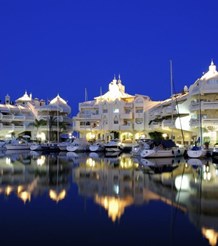
Guide to retiring to Spain
International Living Magazine has just released its Annual Global Retirement Index, which identifies the best places to retire to in the world. It comes as no surprise to fans of the Costa del Sol that Spain is in ninth place among the top ten retirement destinations. Proof that Spain is one of the best countries in the world to retire to comes also in form of statistics published by the Spanish Land Registrar's Association, whose figures for the final quarter of 2017 show that foreign demand for Spanish property rose sharply, with British demand returning to strong growth, too.
In Q4 of 2017 the overall residential real estate market in Spain expanded by 19.8% to 111,921 home sales, the highest fourth quarter level since the Spanish housing market began its recovery in 2015. High British demand is partly due to the fear that moving to an EU country like Spain will become more difficult once the United Kingdom leaves the European Union in March 2019. This means that prices are going up - and potential buyers who have until now hesitated to make a decision should think carefully about delaying further, or their budgets will have to go up.
Every year International Living Magazine looks at various factors that make it desirable to retire to a specific country. Among the criteria investigated are the ease and cost of buying or renting a property, the cost of living as a retiree, visa and residence options on offer, the ease of fitting in and enjoying a healthy and varied lifestyle. Climate, infrastructure, Internet connectivity, amenities and available entertainment are also factors the magazine considered important in its survey.
Spain was one of only two European countries to make it into the top ten, after Portugal. Spain has long been a popular holiday as well as retirement destination for Europeans, especially Brits and Scandinavians, the latter favouring Fuengirola and Estepona, the former Marbella, Torremolinos and Nerja. Increasingly, Americans are also looking to stretch ever-shrinking pension pots a little further, and in their global search they are also heading to countries like Portugal and Spain. Both Spain and Portugal offer non-EU citizens a "Golden Visa" option, meaning for a specified amount of investment people buying real estate in Portugal or Spain can obtain a residency permit.
Blessed with a temperate climate and some 300 days of sunshine, areas like the Costa del Sol with its miles upon miles of sandy beaches and wide range of cultural amenities are hard to ignore, when it comes to choosing a retirement destination. Spain offers a laid-back, outdoor lifestyle, excellent cuisine, lower cost of living for a European country and some of the world's best golf courses for fans of the sport.
Cost of Living
According to International Living Magazine it is possible to enjoy a great lifestyle on around USD 2,100 a month.
There's less need for heating, thus costs are lower in winter than they are in the UK or Scandinavia for example. Travel is also far cheaper, including the cost of train and bus tickets and petrol. Eating out and drinking is also cheaper - there are many places in Spain where a glass of wine or small glass of beer costs just one euro and the "menu del dia" (menu of the day) is widely available across Spain, costing on average just 10.00 euros for a two- or even three-course meal.
Taxation
Although Spain has a reputation for high taxation, there are ways around this with the advice of a good taxation lawyer. With the right taxation advice it is possible to legally avoid paying the full rate of tax and certainly less than one would in the UK.
One is considered a tax resident if one spends more than 183 days during the Spanish calendar year in the country, or if one's family, main professional activity or most of one's assets are based in Spain. As a Spanish resident, one is liable for tax on one's worldwide income and gains, while non-residents of Spain are liable for Spanish income tax only on Spanish-sourced income and capital gains.
Healthcare
Everyone, whether they are an EU citizen or a non-EU citizen, is entitled to emergency cover in Spain.
To qualify, one must register on one's local town hall’s census (padrón), which brings a variety of other benefits including discounts on one's IBI tax (a tax similar to Britain's council tax), free or discounted access to municipal services such as sports centres and libraries and the right to vote for example.
People who live in Spain permanently and receive a UK pension or long-term incapacity benefit may be entitled to state healthcare paid for by the UK. To qualify, one needs a Form S1, which must be obtained in the UK. This form certifies that one is of retirement age and that all the necessary social security taxes have already been paid in the UK. This will then entitle you to the same benefits as a Spanish national.
People who do not qualify for free state healthcare can take out private health insurance, or pay the full cost of any medical treatment they receive. Marbella for example is rapidly becoming "famous" for its private medical care, with health tourism expected to rise at least by 40% over the next year alone. Shop around for quotes, but just as a guide, International Living Magazine obtained a quote from AXA International which was for 6,600 per person per annum for comprehensive cover with no excess and inclusive of taxes. This quote was based on a couple aged 65 and in good health.
There is another option, which is a Spanish health scheme called the "convenio especial", which again requires a permanent resident to be registered on the padrón at their local town hall for a year, then they can participate in a state insurance scheme for a basic monthly fee (about 60.00 euros).
Buying and owning Property
Obtaining a Spanish mortgage has become easier over the last couple of years. Construction is also increasing, which means that it is once again possible to buy off-plan. Prices at the Costa del Sol and Costa Blanca have still not fully recovered yet from their dramatic fall (more than 50% in many areas) during the 2008 economic crisis. Across Spain, property prices are picking up though, and some hot spots like the Balearic Island of Mallorca and Marbella at the Costa del Sol are already seeing a shortage of luxury apartments and villas due to high demand, even though prices have gone up.
For foreign buyers it is important to use a currency exchange brokerage - especially for British buyers. The Pound has taken a pounding compared to other currencies like the euro and dollar for example. This means that it is now more expensive for British buyers to purchase a Spanish property. Appointing a good real estate law firm is essential to avoid any pitfalls along the way, too.
Transferring UK Pensions to Spain
British retirees who decide to live in Spain and are in receipt of a UK State Pension can choose to receive their pension in their UK bank or have it transferred to their Spanish bank account - but beware, the pension will be paid out in Pound Sterling, not euros, so exchange rates matter!
Before leaving the UK, be sure to claim your UK state pension by contacting the International Pension Centre in Britain. For non-EU countries it will depend if there is an agreement in place between your country of origin and Spain. This will include British citizens retiring to Spain after the UK leaves the European Union in March 2019, as the UK will become a "third country" and no longer fall under the reciprocal agreements currently in place with regard to pensions. At the point of writing it is unclear if such an agreement will be in place before the UK leaves the European Union.
Settling in
Many town halls have their own "Foreigner Department", where expats can obtain information on local expat social groups that meet regularly or where to enrol in Spanish classes. Learning at least a smattering of Spanish is important for the process of integration. Joining a few classes, such as ballroom dancing or Salsa dance classes or cookery classes or learning to play golf, tennis or sailing, can open up a whole new world. There are cyclists clubs and hiking groups, drama groups and book clubs one can join to make new friends and enjoy retirement in Spain.






